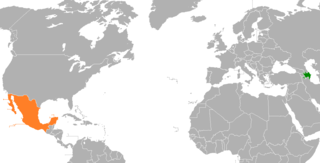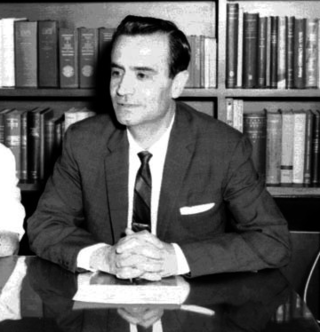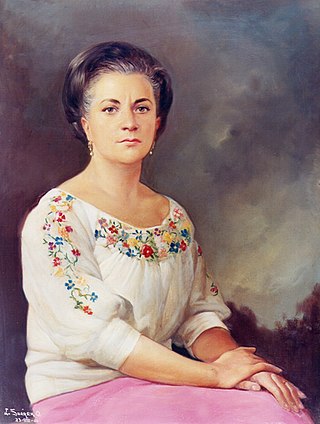
Eleanor Rosalynn Carter was an American writer, activist, and humanitarian who served as the first lady of the United States from 1977 to 1981, as the wife of president Jimmy Carter, the 39th president of the United States. Throughout her decades of public service she was a leading advocate for women's rights and mental health.

José Guillermo Abel López Portillo y Pacheco was a Mexican writer, lawyer, and politician affiliated with the Institutional Revolutionary Party (PRI) who served as the 58th president of Mexico from 1976 to 1982. López Portillo was the only official candidate in the 1976 presidential election, being the only president in recent Mexican history to win an election unopposed.

Luis Echeverría Álvarez was a Mexican lawyer, academic, and politician affiliated with the Institutional Revolutionary Party (PRI), who served as the 57th president of Mexico from 1970 to 1976. Previously, he was Secretary of the Interior from 1963 to 1969. At the time of his death in 2022, he was his country's oldest living former head of state.

The Order of Manuel Amador Guerrero is the highest honour of Panama. Named after Manuel Amador Guerrero, the first president of Panama, the order was established on the 50th anniversary of Panama's independence on 29 October 1953. It is awarded to recognize distinguished people in the sciences, arts, and politics.
Sasha Montenegro, born Aleksandra Aćimović Popović, was a Mexican actress of Montenegrin descent.

The National System for Integral Family Development is a Mexican public institution of social assistance that focuses on strengthening and developing the welfare of the Mexican families. The institution was founded in 1977 by Carmen Romano, the wife of Mexican President José López Portillo and First Lady of Mexico.
Octavio Ocampo is a Mexican surrealist painter. He grew up in a family of designers, and studied art from early childhood. At art school, Ocampo constructed papier mache figures for floats, altars, and ornaments that were used during carnival parades and other festivals. In high school, Ocampo painted murals for the Preparatory School and the City Hall of Celaya. Ruth Rivera, daughter of artist and muralist Diego Rivera, and Maria Luisa Mendoza encouraged him to attend the School of Painting and Sculpture of the National Fine Art Institute.

Blanca María Rodríguez de Pérez was the First Lady of Venezuela from 1974 to 1979 and again from 1989 to 1993.

India and Mexico have had contact since the 1500s, but formal diplomatic relations were first established in 1950. Both nations are members of the G-20 major economies and the United Nations.

General elections were held in Mexico on 4 July 1976. José López Portillo was the only candidate in the presidential election, and was elected unopposed. In the Chamber of Deputies election, the Institutional Revolutionary Party won 195 of the 237 seats, as well as winning all 64 seats in the Senate election. Voter turnout was 65% in the Senate election and 62% in the Chamber election.

The nations of Germany and Mexico first established formal diplomatic relations in 1879, following the unification of Germany. In 1917, the German Empire proposed a World War I alliance with Mexico against the United States in the Zimmermann Telegram before it was foiled by British intelligence agents. The two nations were twice on the opposite sides of 20th century conflicts: first in the Spanish Civil War from 1936 to 1939, and later during World War II from 1942 to 1945. Mexico established relations with both halves of partitioned Germany in 1952 and maintained the relationship through the German reunification in 1990.

Guatemala and Mexico are neighboring nations who established diplomatic relations in 1848. In January 1959 both nations broke diplomatic relations as a result of the Mexico–Guatemala conflict, however, diplomatic relations were re-established 8 months later in September of that same year. Since then diplomatic relations have continued unabated since. Diplomatic relations between both nations are based on close proximity, trade, cultural similarities and a shared history.

The nations of Mexico and Sweden established diplomatic relations in 1885. Both members of the Organisation for Economic Co-operation and Development and the United Nations.
The Ollin Yoliztli Prize was a prestigious but short-lived international prize that was bestowed by the President of Mexico for three consecutive years — 1980, 1981, and 1982 — to living Spanish literature poets, novelists, essayists, and playwrights.

The nations of Azerbaijan and Mexico established diplomatic relations in 1992. Both nations are members of the United Nations.
The following lists events that have happened in 1926 in Mexico.
Margarita López Portillo y Pacheco (1914–2006) was a Mexican novelist who earned several awards for her novels and also had three of them adapted for film. She was a public servant, serving under three presidents in various capacities of regulating media. During her brother José López Portillo's (1976-1982) presidency, she received sharp criticism for his nepotism and failure to act on warnings of potential fire at the National Cinema Library. She studied the works of Sister Juana Inés de la Cruz and led an effort to restore the convent where the Sister had lived. In 1980, she was granted the French Order of Arts and Letters.

"Hail, America" is a regal concert march composed by George Drumm. It is known for its fanfare and trio sections performed during the presidential entrance at state dinners. It has also been used as the honors music for the President-elect of the United States.

Guillermo Álvarez Macías was a Mexican general manager of the co-operative cement company Cemento Cruz Azul from 1955 until his death in 1976. Álvarez Macías led the company's re-foundation into a cooperative company town. A prolific cooperative activist, Álvarez Macías is regarded as a prominent figure of modern cooperatives in Mexico.

María Esther Zuno Arce was the wife of Mexican President Luis Echeverría and the first lady of Mexico from 1970 to 1976. She refused to adopt the standard title of primera dama, preferring to be called compañera. She was known for her efforts to support women's rights and social welfare in Mexico.


















